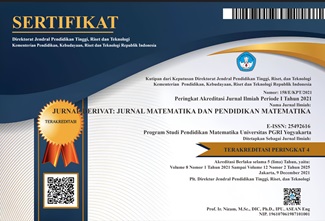sis Kemampuan Komunikasi & Pemecahan Masalah Matematis Siswa SMP Pada Materi Segiempat Dan Segitiga
DOI:
https://doi.org/10.31316/j.derivat.v5i1.145Abstract
This study aims to describe the ability of communication and problem solving of mathematical students in the material quadrilateral and triangle in class VII in one district of MTs Bandung. This type of research is qualitative research with phenomenology model which aims to interpret communication ability and ability to solve the mathematical problem of students. The subjects of this study were 24 students for communication skills and 25 students for math problem-solving skills. The result of data analysis shows that the mathematical communication ability of grade VII students in one MTs in Kabupaten Bandung is still relatively low with the highest percentage being in the low communication ability qualification which is 37.5%, while for students who have ability is get percentage equal to 29,2% and for students with high communication skills get a percentage of 33.3%, while for problem-solving skills in class VII is quite good with the highest percentage in qualification students with high problem-solving ability with a percentage of 44%, while for qualified students who ability is getting percentage by 40%, and for low qualifications only got a percentage of 16%..
Â
Keywords: mathematical communication ability, mathematical problem-solving abilityDownloads
Published
Issue
Section
Citation Check
License
Authors who publish with this journal agree to the following terms:
-
Authors retain copyright and grant the journal right of first publication with the work simultaneously licensed under a Creative Commons Attribution-ShareAlike 4.0 International License that allows others to share the work with an acknowledgment of the work's authorship and initial publication in this journal.
- Authors are able to enter into separate, additional contractual arrangements for the non-exclusive distribution of the journal's published version of the work (e.g., post it to an institutional repository or publish it in a book), with an acknowledgment of its initial publication in this journal.
- Authors are permitted and encouraged to post their work online (e.g., in institutional repositories or on their website) prior to and during the submission process, as it can lead to productive exchanges, as well as earlier and greater citation of published work (See The Effect of Open Access).







